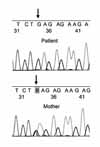Abstract
X-linked agammaglobulinemia is the most common type of primary immunodeficiency disorder. Mutation ofthe cytoplasmic tyrosine kinase gene, Btk (Bruton's tyrosine kinase), is known to be the etiology of X-linked agammaglobulinemia. The patients with this disease manifest a B-cell deficiency and low levels of serum immunoglobulin; due to the deficient antibodies, they suffers from recurrent upper and lower respiratory infections. We report here a 24-year-old male with an initial clinical impression of recurrent pneumonia and bronchiectasis. The patient presented with marked pan-hypogammaglobulinemia and the absence of circulating B-lymphocytes on the immunologic study, and he carried a splicing mutation of intron 2 in the Btk gene (IVS2 ??C>G).
Figures and Tables
Figure 1
(A) Chest X-ray taken before admission showed pneumonic consolidation on right middle lobe. (B) Chest X-ray on admission showed diffuse bronchiectatic change with patchy consolidation and ground glass opacity in both middle lung field and both lower lung field. (C) Chest X-ray taken after treatment with antibiotics and gammaglobulin.

References
1. Genevier HC, Hinshelwood S, Gaspar HB, Rigley KP, Brown D, Saeland S, et al. Expression of Bruton's tyrosine kinase protein within the B cell lineage. Eur J Immunol. 1994. 24:3100–3105.
2. Vetrie D, Vorechovsky I, Sideras P, Holland J, Davies A, Flinter F, et al. The gene involved in X-linked agammaglobulinaemia is a member of the src family of protein-tyrosine kinases. Nature. 1993. 361:226–233.
3. Ochs HD, Smith CI. X-linked agammaglobulinemia: a clinical and molecular analysis. Medicine (Baltimore). 1996. 75:287–299.
4. Winkelstein JA, Marino MC, Lederman HM, Jones SM, Sullivan K, Burks AW, et al. X-linked agammaglobulinemia: report on a United States registry of 201 patients . Medicine (Baltimore). 2006. 85:193–202.
5. Lee AH, Levinson AI, Schumacher HR Jr. Hypogammaglobulinemia and rheumatic disease. Semin Arthritis Rheum. 1993. 22:252–264.
6. Futatani T, Miyawaki T, Tsukada S, Hashimoto S, Kunikata T, Arai S, et al. Deficient expression of Bruton's tyrosine kinase in monocytes from X-linked agammaglobulinemia as evaluated by a flow cytometric analysis and its clinical application to carrier detection. Blood. 1998. 91:595–602.
7. Futatani T, Watanabe C, Baba Y, Tsukada S, Ochs HD. Bruton's tyrosine kinase is present in normal platelets and its absence identifies patients with X-linked agammaglobulinaemia and carrier females. Br J Haematol. 2001. 114:141–149.
8. Conley ME, Notarangelo LD, Etzioni A. Diagnostic criteria for primary immunodeficiencies. Representing PAGID (Pan-American Group for Immunodeficiency) and ESID (European Society for Immunodeficiencies). Clin Immunol. 1999. 93:190–197.
9. Lee HJ, Ko JS, Kwon SS, Yoo JH, Min JK. A case of X-linked agammaglobulinemia with deletion of introns 15-18 of Btk gene mediated by Alu-Alu recombination. Korean J Med. 2003. 65:S798–S804.
10. Yu CM, Koh WJ, Kim KC, Lee BH, Hwang JH, Kang EH, et al. X-linked agammaglobulinemia associated with bronchiectasis: a case report. Tuberc Respir Dis. 2003. 54:628–634.
11. Kim YC, Choi IS, Lee MS, Park SS, Koh YI, Jung IJ, et al. A case of Bruton's agammaglobulinemia. Korean J Med. 1994. 47:721–726.
12. Jang SH, Kho WJ, Kim CH, Chung KH, Lee JH, Chung HS, et al. A case of X-linked agammaglobulinemia. Korean J Med. 1997. 53:426–430.
13. Kim HS, Chung CH, Shin YG, Lee MD, Kim MJ, Kim HY, et al. A case of X-linked agammaglobulinemia with delayed growth. J Korean Soc Endocrinol. 1999. 14:153–159.
14. Rosen FS, Cooper MD, Wedgwood RJ. The primary immunodeficiencies. N Engl J Med. 1995. 333:431–440.
15. Skull S, Kemp A. Treatment of hypogammaglobulinaemia with intravenous immunoglobulin, 1973-93. Arch Dis Child. 1996. 74:527–530.




 PDF
PDF ePub
ePub Citation
Citation Print
Print




 XML Download
XML Download